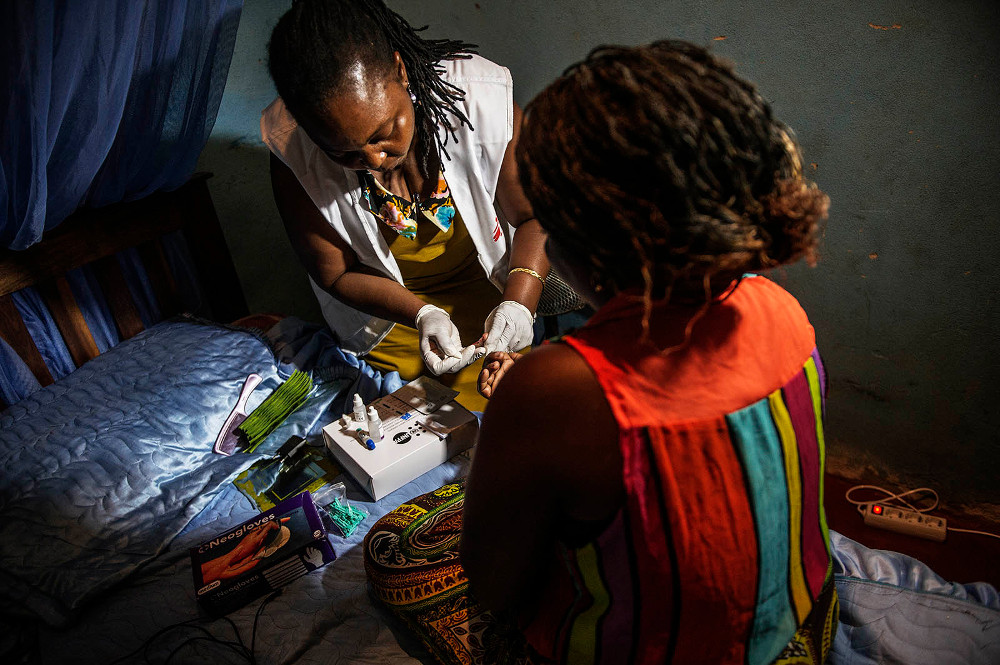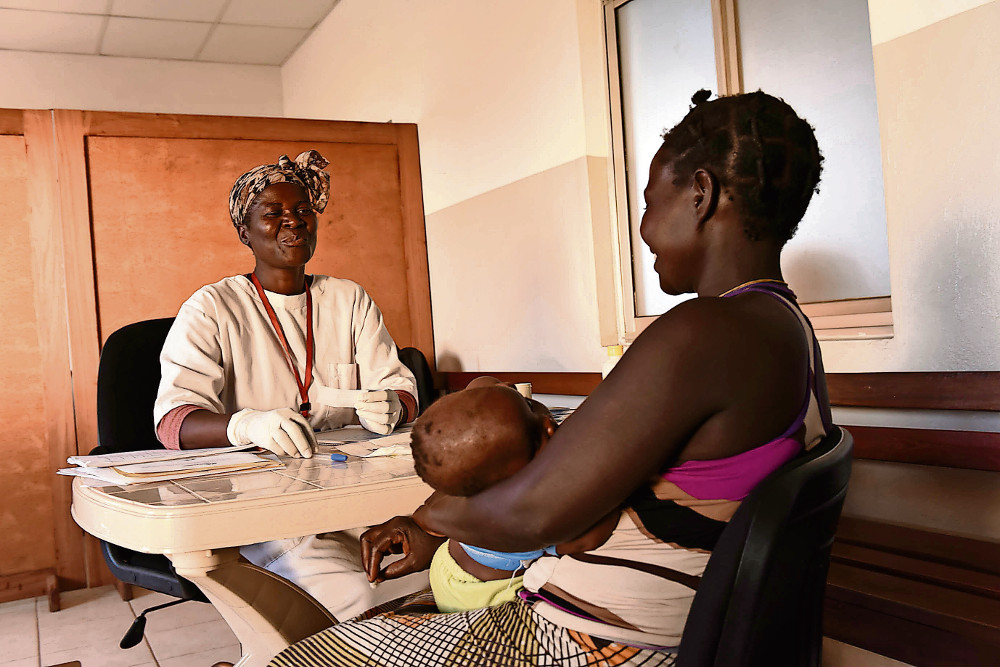HIV testing has tripled in the four villages – Nqileni
A cloud of dust gathers behind a truck speeding past a clinic along the main road in Matola Gare on the outskirts of Maputo, Mozambique. Women with infants bundled in their arms are waiting to be seen by a doctor or nurse.
Inside one of the consultation rooms, a six-week-old baby kicks restlessly as a nurse puts him on top of a scale.
Today is his first visit to the clinic. His mother is infected with HIV.
Handing him back to his mother, the nurse pricks the heel of one of his feet with a needle. She squeezes until a drop of blood appears and collects it in a small cartridge.
Another nurse takes down the mother’s details and puts the cartridge with the baby’s blood into a small machine on a desk. After pressing a few buttons, she takes off her latex gloves.
“The results will be ready in 51 minutes,” she says, making a note in the patient’s file. “Then we will know if the baby has HIV or not.”
This clinic is one of 12 facilities in Mozambique that are part of a study to assess the effect of point-of-care technology in the early diagnosis and treatment of babies who have been exposed to HIV.
“Point-of-care simply refers to the facility where the patient is accessing the care,” says Chishamiso Mudenyanga, a laboratory specialist from the Clinton Health Access Initiative, one of the organisations conducting the research. “These machines are like a laboratory in a box, and because it is in the facility the patient can get their results and start treatment in one day.”
 A sex worker in Beira is tested for HIV. (Gianluigi Guercia, AFP)
A sex worker in Beira is tested for HIV. (Gianluigi Guercia, AFP)
According to the World Health Organisation (WHO), babies born to HIV-positive women should undergo a virological test, which can detect whether HIV is present in their blood. Serological testing, or testing for HIV antibodies that are produced as part of the immune system’s response to infection, is not recommended for infants younger than 18 months because “maternal HIV antibodies are transferred to the baby passively during pregnancy”.
Studies have shown that babies’ immune systems only mature at about 18 months. This means the baby could test positive for HIV during this 18-month period despite being negative, because the mother’s antibodies are still present in the baby’s immune system.
The WHO further recommends that babies be tested for HIV within four to six weeks of birth. Babies found to be infected with HIV must start treatment as soon as possible, regardless of the strength of their immune systems measured by a CD4 count. Research shows that antiretroviral treatment in children can reduce HIV-related illnesses such as diarrhoea and tuberculosis by more than 80%.
But, says the WHO, only about half of the estimated 1.2-million babies born to HIV-positive women globally in 2015 had access to an infant diagnostic test. As a result, only half the number of children infected with the virus are on treatment.
Recently, the WHO approved two devices that can diagnose HIV in infants in less than an hour when compared with laboratory testing. The two new devices do virological testing, also known as a polymerase chain reaction test, in less than an hour compared with the long conventional laboratory process. One of these devices, the Alere, is being tested in Mozambique to see how it can improve the health of babies exposed to the virus.
“We have seen it working very well. We are coming to the end of the pilot phase and hope that our recommendations are approved so that other facilities in the country can use a point-of-care system,” says Mudenyanga.
The conventional system, he says, faces myriad of challenges, one being poor infrastructure in rural areas, which causes delays in getting blood samples to a central laboratory for analysis and further delays in getting the results back to the clinic.
“The minimum waiting time for these tests is supposed to be 28 days. But we used to wait for six months, sometimes even a year, for results,” says Fatima Fuma, a nurse at the clinic. “We’ve had to send many patients home without results and without treatment.”
Testing could allow babies to live beyond second birthday
According to the United Nations Children’s Fund (Unicef), without treatment, half of the babies born with HIV will die before their second birthday. “Now we are able to test the babies and if they are HIV positive we put them on treatment on the same day,” says Fuma.
UNAids says nearly 16% of pregnant women in Mozambique are infected with HIV.
Because of the introduction of prevention of mother-to-child transmission programmes, there has been a 57% decrease in new HIV infections among babies between 2009 and 2013 in Mozambique, according to UNAids.
The number of HIV-infected pregnant women receiving antiretroviral therapy (ART) to prevent transmitting the virus to their unborn babies increased from 36% in 2009 to 84% in 2013.
But the number of women who continue to take antiretroviral treatment after giving birth is declining. Unicef estimates that in the first year after birth only 70% of these women stay on treatment. This figure drops to 60% in the second year.
About 12% of 18-month-old babies born to HIV-positive women in Mozambique are infected with HIV, according to UNAids statistics released in 2014. This figure is believed to be much higher because only 35% of HIV-exposed babies receive an early infant diagnosis.
Mudenyanga says the introduction of point-of-care technology in low-resourced areas can dramatically improve access to healthcare, especially in a country such as Mozambique where HIV prevalence is high.
“The system is overburdened by the demand; there are only five laboratories in the country that conduct early infant diagnosis of HIV,” says Mudenyanga.
 Francisca Vasco tests for a young mother at a night clinic in Moatize, Tete. (Felco Calderin)
Francisca Vasco tests for a young mother at a night clinic in Moatize, Tete. (Felco Calderin)
Back at the clinic in Matola Gare, the woman with the six-week-old baby walks back into the consultation room. Her baby is now sound asleep. It’s been less than an hour since he was tested.
She smiles: the test was negative. Her little boy doesn’t have HIV.
But the boy is not out of the woods yet; he is still at risk of being infected with HIV through his mother’s breast milk. But his risk will be minimal if his mother feeds him only breast milk for six months and the baby receives the antiretroviral drug Nevirapine. Because she is HIV positive, the mother must take ART for the rest of her life. Mozambique is moving to implement WHO recommendations that all pregnant women diagnosed with HIV begin lifelong ART. Previously, mothers would stop the treatment after breastfeeding.
The baby will be tested again, at the end of the breast-feeding period to make sure that efforts to prevent him getting HIV from his mother have been successful.